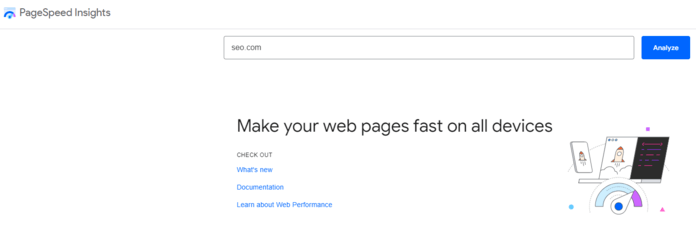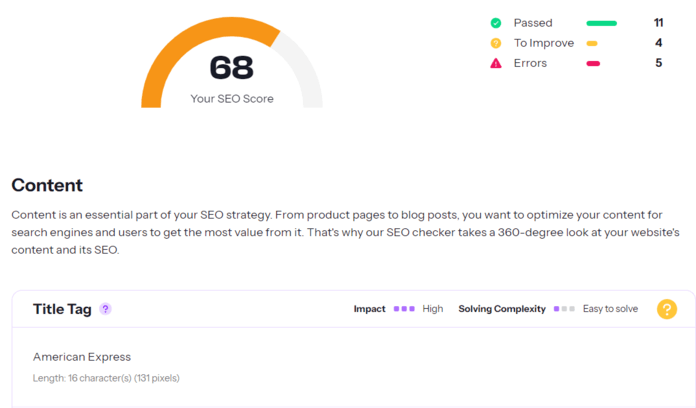What is an SEO report?
An SEO report is a summary of metrics that indicate how your website performs in search results.
Search engine optimization (SEO) is a long-term investment that requires continuous monitoring to ensure it’s producing the results you desire. That’s why it’s important to generate an SEO report — this report will tell you what’s working, what isn’t, and what needs improvement.
If you’ve never created an SEO report, you’ve come to the right place. We’ll break down everything you need to know about SEO reporting, including:
- What is an SEO report?
- Types of SEO report
- Technical SEO Health and Optimization
- Why do I need to run an SEO report?
- How to create an SEO report in five easy steps
- What to include in an SEO report?
- Using SEO reporting tools
Let’s dive in!
What is an SEO report?

An SEO report is a summary of metrics that indicate how your website performs in search results. These search metrics allow you to track your SEO’s performance and better understand where you need to improve your SEO strategy.
Your SEO report will look at areas like:
- Overall website health
- Organic traffic
- Technical aspects of your website (website speed, for example)
- On-page optimizations (title tags, meta descriptions, etc.)
- Backlinks and internal links
- And more!
What is an SEO rank report?
An SEO rank report is slightly different from a standard SEO report. An SEO ranking report looks solely at your website’s performance in search results over time. This report helps you see what pages rank well, how page rankings change over time, and more.
This report tells you how you’re performing in search results, but doesn’t tell you the cause. If your rankings dropped, for example, a ranking report won’t tell you why.
An SEO report, on the other hand, can give you an idea of why it may have happened. If your SEO report comes back saying your website is too slow, it could be the reason for your dropped rankings.
Using these two reports in conjunction with each other can give you a better overall picture of your SEO performance.
Check your Traffic in Seconds

Types of SEO reports
SEO reports can be broken down into two main types:
- Initial reports: Just like its name suggests, an initial report lets you gain insight into your initial SEO performance. It can serve as a benchmark for comparing your later SEO strategies and make it easier to determine what’s going well and what may need more work.
- Ongoing reports: To take a closer look at the current results of your campaign, there are ongoing reports. These are usually delivered every month and contain key metrics on the performance of your website.
Technical SEO Health and Optimization
In the ever-evolving world of digital marketing, maintaining a robust technical SEO health is paramount for ensuring your website’s success. Technical SEO refers to the optimization of your website’s infrastructure to help search engines crawl, index, and render your site effectively. Below are some common technical SEO problems that websites often face, along with suggestions on how to address them.
- Slow Site Speed: The loading speed of your website plays a crucial role in user experience and SEO rankings. Websites that load slowly can lead to higher bounce rates, which negatively impacts your search engine visibility. To improve site speed, consider optimizing images, leveraging browser caching, and minimizing HTTP requests. Tools like Google PageSpeed Insights can provide valuable insights to help you identify specific issues.
- Poor Mobile Responsiveness: With a significant amount of web traffic coming from mobile devices, having a mobile-friendly site is no longer optional. A site that is not optimized for mobile can deter users and harm your SEO rankings. Implementing responsive design, ensuring that images and text are easily readable on smaller screens, and testing your site across various mobile devices are essential steps to enhance mobile responsiveness.
- Crawling Errors: Search engine crawlers must be able to access and index your website efficiently. If your site has crawling errors, it can hinder search engines from understanding your content. Regularly check your website’s health using tools like Google Search Console to identify and resolve issues such as broken links or server errors.
- Issues with Sitemaps: An XML sitemap helps search engines discover your web pages. If your sitemap is missing or improperly configured, it can lead to indexing issues. Ensure that your sitemap is up-to-date and submitted to search engines. Additionally, check for any errors in the sitemap that could prevent crawlers from accessing important pages.
- Robots.txt File Problems: The robots.txt file instructs search engines on which pages to crawl and which to avoid. Misconfigurations can lead to unintentional blocking of important content. Regularly review your robots.txt file to ensure that it is correctly set up and does not hinder your site’s visibility.
Why do I need to run an SEO report?
So, what’s the value in running an SEO report? How does it benefit your business?
Here are a few reasons you’ll want to run regular SEO reports:
- SEO reports help you see where to improve: When you implement your SEO strategy, you want to ensure it’s working effectively. SEO reports help you see where you fall short and need to make improvements.
- SEO reports help you identify technical issues: Technical SEO issues aren’t always easy to spot, which makes SEO reporting crucial. Your SEO reporting can help you identify any technical issues on your website that hinder you from ranking better.
- SEO reports help you keep tabs on website changes: As time goes on, you’ll change your website, adding some things to it and removing others. Running frequent SEO reports helps you see how those changes negatively or positively affect your SEO performance.
- SEO reports help you analyze and track competitors: By taking the time to analyze and track your competitors, it’s easier to determine what areas you can improve in and what changes need to be made so you’re positioned to outperform them.
- SEO reports help you increase your ROI: With the data and insights you gain from your report, you’ll be able to come up with more tailored strategies, which will boost your return on investment (ROI).
How to create an SEO report in five easy steps
So, you’ve been convinced of the benefits of running an SEO report — now where do you start? Let’s break down how to create an SEO report in five easy steps so you can get started!
1. Set your key performance indicators (KPIs)
The first step to creating an SEO report is determining what key performance indicators (KPIs) to include in your report. These metrics are the ones that matter most to your business and are the best indicators of whether you’re achieving your goals.
Some common metrics included in SEO reports include:
- Website traffic
- Page load speed
- Backlinks
- Conversions
The metrics you include will vary depending on your business’s goals and what matters most to you.
2. Determine how frequently you want to do reporting
Once you know what you’re tracking, you’ll want to determine how you run an SEO report. If you just started with SEO, you’ll want to wait at least six months to do your SEO reporting. Since SEO is a strategy that takes time to show results, you’ll want to wait a few months to do your report.
If you’ve already had your SEO strategy in place for a while, you’ll want to determine how often you want to track and report on your SEO. You can opt to report bi-weekly, monthly, or quarterly.
3. Design your report
The most difficult of all the steps in creating an SEO report is designing your report. You’ll want to choose a layout that is logical, organized, and easy to read.
You can opt to create a spreadsheet, PDF, or a slideshow to gather all your data. If you aren’t sure how you want it to look, you can always find a SEO report template that fits your business’s needs.
4. Know what tools you’ll use to fill your report
Once your template is set, the next step in SEO reporting is to determine what tools you’ll use to help fill your report. What tools you use largely depends on what metrics you include in your SEO report.
Google Analytics is a great tool to use to gather data on your SEO. You can see information on organic traffic, conversions, and more. If you wanted to check page speed, you could use Google PageSpeed Insights or other site speed tools.

Once you know what tools you’ll use to provide the data, you can start putting that data into your SEO report.
5. Figure out your next steps
Once you have all your data in your SEO report, you can see the bigger picture of your SEO performance. You can identify where your performance has dropped and where you need to make improvements.
After understanding where you fall short, you can create a strategy to start improving your SEO efforts.
Not sure where to start with improving your SEO? Check out this blog post for tips on how to improve your search engine performance!
What to include in an SEO report
The majority of an SEO report will focus on key performance indicators (KPIs), which help show how whether or not you are meeting goals.
Consider adding metrics like:
- Organic search traffic: This shows you how many people are visiting a page on your site from unpaid search engine results. Your SEO strategy is what will have an impact on where your pages rank in the search engine results page (SERPs).
- Organic conversion rate: The conversion rate can be broken down into your best converting pages, new visitor conversion rate, returning visitors conversion rate, and more. With this metric, you’ll be able to determine how many visitors to your site from unpaid search results completed the desired action.
- Backlinks: Your page’s backlinks can make a big difference in where you rank on Google. As one of the main ranking signals, backlinks is one of the most important elements of your SEO strategy. It helps show that your site has authority, which can boost your placement in the SERPs.
- Keyword ranking: Another key metric to include is keyword ranking. This will let you get a closer look at how many keywords your site is ranking for, the average ranking position, how your search visibility changes over time, and more. This allows you to analyze your overall strategy and keep up with algorithm updates.
An alternative to creating your SEO report: Using an SEO reporting tool
Now that you’ve seen how to create an SEO report, you may feel overwhelmed — there’s a lot to do. If you feel like creating a manual report will take too much time, consider using an SEO reporting tool instead.
SEO Checker, for example, is a free tool you can use that enables you to input your website’s URL to get a report on your SEO. It automatically scans your website and detects issues with your SEO.

SEO Checker will provide a detailed report on your:
- Indexability and crawlability
- Structured data
- Page load speed
- Backlinks
- Mobile-friendliness
- And more!
You’ll get a breakdown of the impact of those issues, how easy they are to solve, and how to solve them.
Get your free SEO report today
If you’re ready to see how your SEO is performing, use our free SEO checker to find out. If you need assistance in generating insightful reports or optimizing your SEO strategy, our professional team is here to help! Contact us online today to learn how we can support your SEO efforts and drive better results for your business.
Let’s Drive Results Together

$3bn+
revenue driven for clients



Add WebFX to your content marketing toolbox today
Get SEO ProposalTable of Contents
- What is an SEO Report?
- Types of SEO Reports
- Technical SEO Health and Optimization
- Why Do I Need to Run an SEO Report?
- How to Create an SEO Report in Five Easy Steps
- What to Include in an SEO Report
- An Alternative to Creating Your SEO Report: Using an SEO Reporting Tool
- Get Your Free SEO Report Today
$3bn+
revenue driven for clients



Add WebFX to your content marketing toolbox today
Get SEO Proposal




